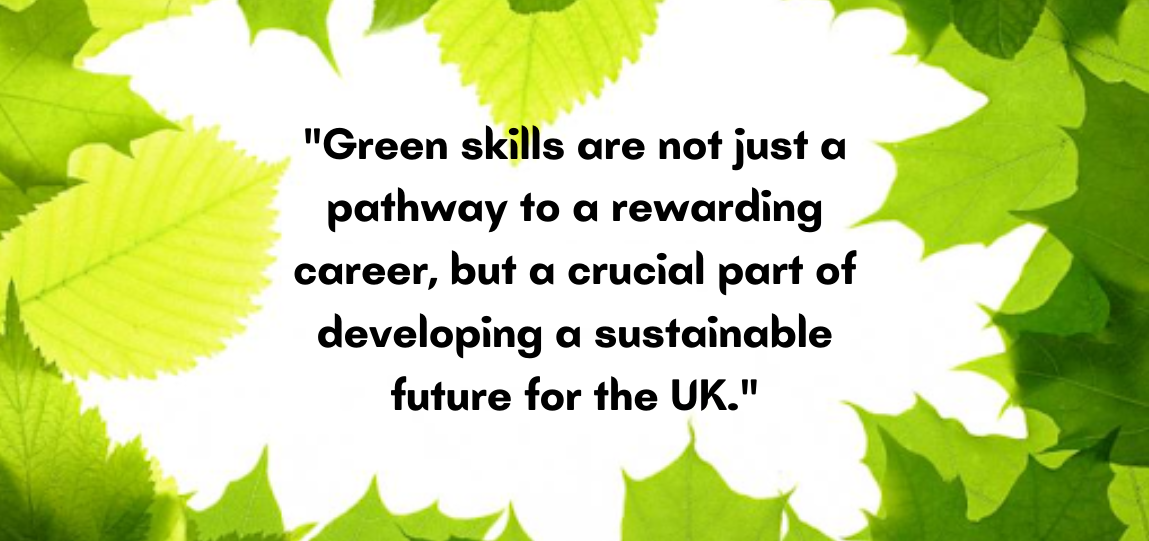
How Green Skills Can Help You Thrive in the UK’s Sustainable Future
In today’s world, the rapid shift towards a more sustainable and environmentally friendly economy is not just a trend but a necessity. Green Skills are becoming increasingly valuable across various sectors in the UK, opening up many opportunities for individuals ready to embrace the change into a green economy.
What are green skills?
Green Skills refers to the knowledge, abilities and attitudes required to support and drive sustainability efforts in various industries. These skills include:
- Technical skills: Expertise in renewable energy technologies, energy efficiency, sustainable construction and environmental science.
- Soft skills: problem-solving, critical thinking, project management and effective communication, all applied within the context of sustainability.
- Green business practices: understanding sustainable business models, circular economy principles and Eco-friendly supply chain management.
Why are Green Skills important?
“The low-carbon economy could grow 4 times faster than the rest of the economy, supporting 2 million jobs by 2030”
- Career Development: As companies and industries across the UK adopt sustainable practices, there is a growing demand for employees with green skills. From renewable energy engineers to sustainability consultants, the job market is expanding with roles that require an understanding of environmental issues and sustainable solutions.
- Economic Opportunities: There is currently major growth within the green economy, primarily led by policies and investments. According to the UK government, the low-carbon economy could grow 4 times faster than the rest of the economy, supporting 2 million jobs by 2030. By acquiring Green Skills, you position yourself to take advantage of these emerging opportunities.
- Environmental Impact: Green Skills enable you to make a substantial difference in the fight against climate change. Whether you are designing energy-efficient buildings, developing renewable energy projects or implementing waste reduction strategies, your work can make a significant difference to the environment.
- Personal Fulfillment: Working within an industry or company that aligns with your views can be incredibly rewarding. Many people find a sense of purpose and fulfillment in careers focused on sustainability.
Green Skills in different sectors
Many sectors are now adopting Green Skills to work towards economic sustainability and to fight climate change. The job roles can be diverse ranging from practical hands-on jobs to office-based design work. Some examples are:
- Energy: Skills in solar, wind and hydro energy technologies are essential for the renewable energy sector. This includes everything from installation and maintenance to system design and project management.
- Construction: Sustainable construction practices require knowledge of energy-efficient building design, green materials and Eco-friendly construction techniques. Green Skills can help you contribute to building projects that maximise efficiency and minimise environmental impact.
- Agriculture: Sustainable agriculture involves techniques such as organic farming, soil health management, forestry and sustainable food systems. These practices increase food security and reduce the carbon footprint of farming.
- Manufacturing: Green manufacturing focuses on reducing waste, improving energy efficiency and using sustainable materials. Skills in these areas are crucial for making the manufacturing process more Eco-friendly.
- Auditing: Environmental auditors and consultants need Green Skills and knowledge to assess environmental impacts, develop sustainability strategies and shape regulations that promote sustainable development.

By investing in these skills, you can enhance your employability, contribute to the green economy and play a vital role in addressing the environmental challenges of our time. Whether you are just starting your career or looking to make a change, there has never been a better time to embrace the potential of Green Skills.
